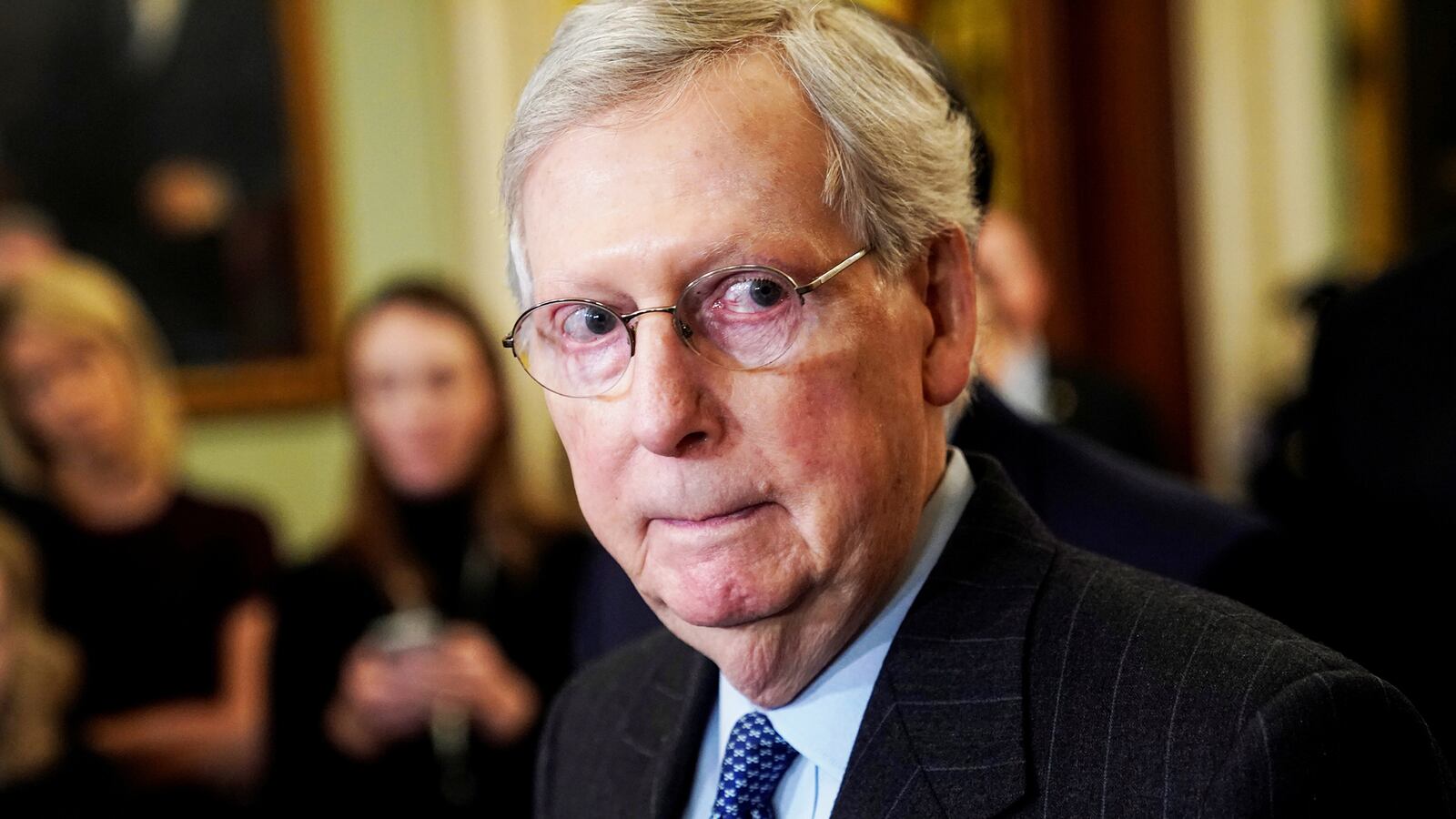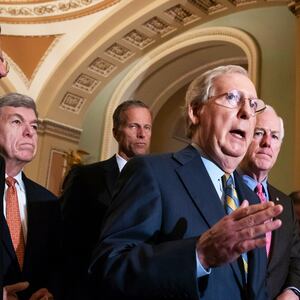President Trump’s declaration that he would welcome any dirt on his 2020 opponents from foreigners may have been even too shocking for most diehard Republican to fully embrace. But within 24 hours, members of the president’s party had done the next best thing: derailing the one piece of legislation that would have shed light on which foreigners were meddling in U.S. elections.
On Thursday, Sen. Marsha Blackburn (R-TN) objected to quick consideration of a bill championed by Sen. Mark Warner (D-VA) that would have required campaigns to notify federal authorities if they are contacted by foreign entities. The freshman Republican claimed that the reporting requirements in the bill were onerous.
“It would apply to door-knockers, it would apply to phone bankers, down to any person who shares their views with a candidate,” said Blackburn, who raised the prospect that the bill could even spell trouble for Dreamers, the undocumented youth brought to the U.S. as children.
Few bought the argument, least of all Warner who said that his bill would only apply to activities that are already illegal. But the dust-up nevertheless illustrated, yet again, that the biggest impediment to applying more safeguards to foreign interference in elections may not come from Trump himself, but from Senate Majority Leader Mitch McConnell (R-KY).
McConnell’s office did not respond to request for comment for his stance on the Warner bill. But the Kentucky Republican has an unstated policy of refusing to take up any election-security legislation. Democratic aides operated Thursday on the assumption that Blackburn was doing his bidding when she objected to a unanimous consent agreement on Warner’s bill.
McConnell’s obstinacy has drawn frustration from senators on both sides of the aisle, many of whom say that if these bills were put to a vote, they would pass easily. Indeed, even Warner’s bill has Republican supporters.
“His idea sounds like a good one to me,” said Sen. Lindsey Graham (R-S.C.), a top Trump ally and the chairman of the Senate Judiciary Committee. Others, like Sen. John Kennedy (R-LA), expressed openness to backing Warner’s legislation too.
But McConnell has stood in the way of consideration of this and similar measures, even as President Trump has grown more open about his willingness to embrace the help of foreign actors during his re-election campaign. A month ago, when Senate Democrats pushed legislation to secure the nation’s election systems, Sen. Dick Durbin (D-IL) asked Sen. Roy Blunt (R-MO) why such a bill would likely never find its way to the Senate floor.
“Same reason we couldn’t get our bill to the floor last year,” Blunt replied. “I think the majority leader just is of the view that this debate reaches no conclusion.”
Speaking to reporters before going to the floor on Thursday, Warner stressed that he is open to tinkering with the bill if it allowed to get the legislative ball rolling.
“If there’s ways to improve, let’s improve on them,” he said. “We’re 17 months away from the next election and we have the director of the FBI and the Director of National Intelligence saying Russia or others will be back to interfere. If you really care about the integrity of elections, let’s step up and put this in place and work through some of these very legitimate questions.”
And elsewhere on the Hill, lawmakers from both parties stressed on Thursday that they did not agree with the president’s assertion that it was standard operating procedure for politicians to accept help from foreign entities. “I’m not… having contact with foreigners,” said Sen. Rick Scott (R-FL). Referring to the Russians, Scott added “we ought to do everything we can to make sure they’re not involved.”
Already, accepting such assistance is considered against the law, as noted on Thursday evening by the chair of the Federal Election Commission. But Warner’s bill, titled the Foreign Influence Reporting in Elections Act, would add another layer of transparency to any interactions that precede the assistance. The bill would give campaigns one week to report to the FEC any contacts with foreign nationals offering them donations, “coordination or collaboration,” or “an offer or provision of information or services.” The FEC then must pass on any reports of foreign interference to the FBI. Beyond that, the bill also requires campaigns to train their staffers on navigating the law and to certify to federal authorities that they are complying with the law.
While he and other Democrats spent much of Thursday demanding a legislative response to Trump’s remarks, the president and his team offered indignant yawns. One White House official told The Daily Beast that Trump’s remarks to ABC News weren’t “substantively” much from different what he’s said in the past. The official noted that they had heard the president say at one point last year, “Why wouldn’t you [take those kinds of meetings]?” in a discussion regarding dirt potentially shopped by a foreign power.
Publicly, Trump has been inching toward the position he explicitly staked out in the ABC interview. In August of last year, he tweeted that there was nothing untoward about taking meetings like the one his eldest son, his son-in-law, and his then campaign chairman had attended with Russian officials at Trump Tower during the 2016 campaign.
“This is all much ado about nothing,” said Ed Brookover, a longtime GOP strategist and a veteran of Trump’s 2016 presidential campaign. “He said if something illegal or illicit occurred, he would report it. You listen, then you decide what to do, if you listen at all. This is clearly another attempt by Trump’s opponents to portray his statements in a way that just wasn’t the case.”
Brookover also said, “You follow up and you see what’s going on—that’s what campaigns do all the time,” and that in “itself is not unethical or against the law; it may not be very smart politically but it’s not illegal… Campaigns use foreign entities to do work all the time. Nobody questioned the [Trump campaign’s] use of Cambridge Analytica because they were British, though some questioned their effectiveness.”








